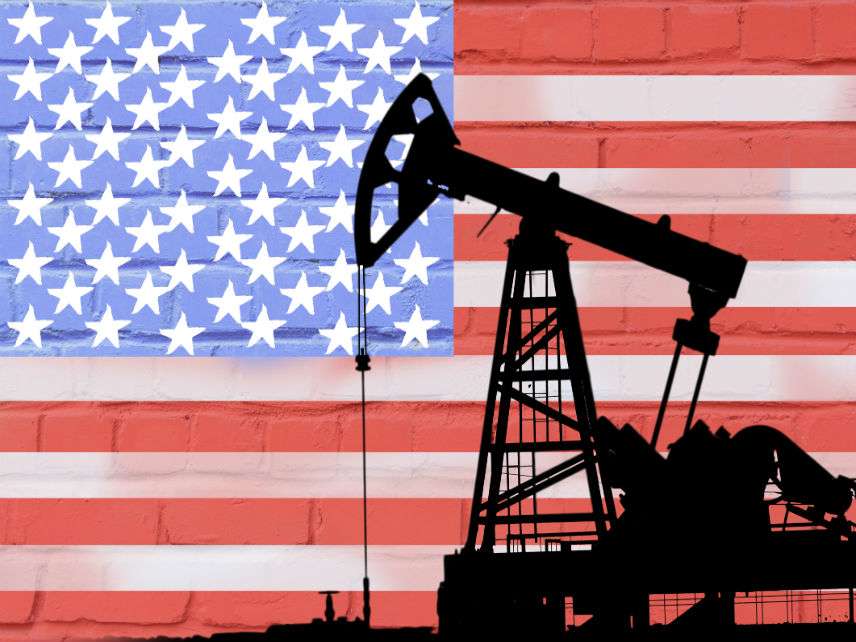Trump Praises America's Oil and Natural Gas Production in State of the Union Address
The U.S. is the world's biggest producer of oil and natural gas

"We have unleashed a revolution in American energy—the United States is now the number one producer of oil and natural gas in the world," declared President Donald Trump in his State of the Union address Tuesday night. While Trump's paean to our country's robust oil and gas industry will incense Keep It in the Ground activists, even the Green New Deal Congressional resolution currently being crafted recognizes that banning fossil fuels is not feasible.
Oil and natural gas production in the U.S. is indeed soaring. According to the latest Energy Information Administration report, U.S. crude oil production stands at 11.9 million barrels per day. That's just shy of 24 percent more than the 1970 peak of 9.6 million barrels per day. So much for Hubbert's Peak!
And the U.S. is certainly number one: Saudi Arabia and Russia produce about 10.8 and 11 million barrels per day, respectively.
The U.S. is also now the world's biggest producer of natural gas, at about 853 billion cubic meters in the last 12 months. The next biggest producers in 2017 were Russia and Iran at 694 and 209 billion cubic meters correspondingly.
Trump also claimed that "for the first time in 65 years, we are a net exporter of energy." He is evidently referring to oil exports and imports. This is a bit more complicated.
As Forbes energy commentator Robert Rapier noted in December, the U.S. consumes the equivalent of 20 million barrels of oil per day. That implies a shortfall of about 8 million barrels of oil per day. That gap is filled with a mixture of natural gas liquids, ethanol, and finished product exports and imports.
Even taking these other fuels into account, Rapier finds that the U.S. still consumes 2 million barrels per day more of petroleum products than we produce. Still, it is a remarkable achievement that daily U.S. imports have steeply fallen from a peak of 10.5 million barrels per day in 2004.
Editor's Note: As of February 29, 2024, commenting privileges on reason.com posts are limited to Reason Plus subscribers. Past commenters are grandfathered in for a temporary period. Subscribe here to preserve your ability to comment. Your Reason Plus subscription also gives you an ad-free version of reason.com, along with full access to the digital edition and archives of Reason magazine. We request that comments be civil and on-topic. We do not moderate or assume any responsibility for comments, which are owned by the readers who post them. Comments do not represent the views of reason.com or Reason Foundation. We reserve the right to delete any comment and ban commenters for any reason at any time. Comments may only be edited within 5 minutes of posting. Report abuses.
Please to post comments


NGL FTW!
MAGA!!!!!!
AA/FA #MAGA
USA!
USA!
USA!
USA!
USA!
USA!
USA!
USA!
Even taking these other fuels into account, Rapier finds that the U.S. still consumes 2 million barrels per day more of petroleum products than we produce. Still, it is a remarkable achievement that daily U.S. imports have steeply fallen from a peak of 10.5 million barrels per day in 2004.
True, but there's a very good chance we will be fully energy independent within the next two or three years or so.
That would be truly be making America great again in a big way!!
The real story however is that we can now say with certainty that the famed geologist Marion King Hubbert and his theories were 100% dead wrong.
Hubbert is mostly known for predicting that oil production in the United States would resemble a bell curve, peaking some time in or around 1972. For a long time it looked like he might be right, but we're now officially above the old peak and we are going to go much higher.
So, #1, not a bell curve, and #2, there are massive amounts of oil and other so-called "fossil fuels" in the earth, WAY way more than he believed to be case in his time. Hubbert made the same mistake so many people in the scientific community continue to make time and again: he didn't take incredible human ingenuity into account like he should have.
WCR: You did click on the Hubbert's Peak link in the above blogpost, right?